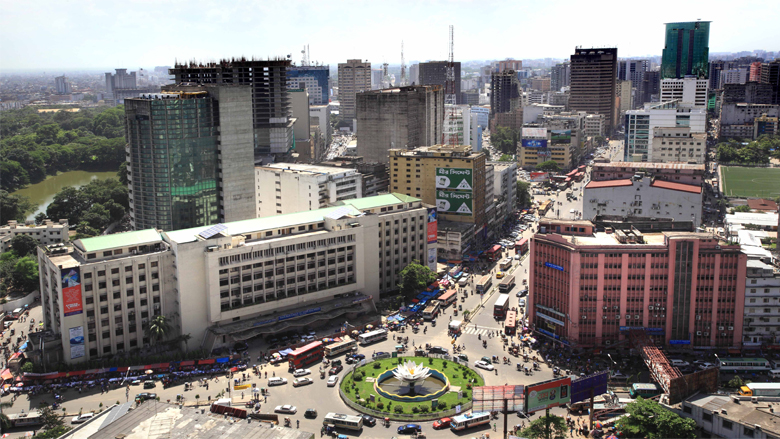Staff Correspondent
Published:2025-11-10 19:52:04 BdST
Sluggish growth looms for Bangladesh due to geopolitical tensions
Bangladesh’s economy continues to show stability and positive momentum. Yet, persistent geopolitical tensions pose a potential threat to its growth path, according to a recent comprehensive report by Bangladesh Bank.
The report highlights that the economy has managed to sustain steady GDP growth in recent years despite facing multiple challenges.
Positive trends in the foreign trade sector, strong domestic demand, a slight decline in inflation, and improvements in foreign currency reserves are all sending reassuring signals about the economy.
Favorable weather and lower commodity prices in international markets are helping to keep inflation under control.
However, there are several risks to sustaining this positive trend. In particular, ongoing regional and global political instability is a major concern for Bangladesh.
Conflicts among neighboring countries, the war situation in the Middle East, instability along trade routes like the Red Sea and the Malacca Strait, and the US-China trade tensions could impact both Bangladesh’s exports and imports.
The Bangladesh Bank report indicates that these geopolitical risks could create volatility in global markets for oil and food, potentially pushing inflation upward again. At the same time, uncertainties may arise regarding export orders for ready-made garments and remittance inflows.
Nevertheless, the central bank is optimistic that ongoing reforms in the banking sector, particularly the merger process and restructuring of the financial sector, will help make the economy more sustainable. In addition, if the downward trend in inflation continues, policy interest rates may also be adjusted.
Business leaders, however, say there is no conducive environment for business in the country, leaving them under significant pressure. Fazle Shamim Ehsan, President of the Bangladesh Employers Federation (BEF), said, “Currently, there is no business environment in Bangladesh. Investors are not making new investments.
As a result, business activity has slowed, exports have decreased, and demand for dollars has also fallen. Since imports are closely linked with exports, it’s easy to understand why imports are declining.”
He added, “The lack of new investment is gradually worsening the employment crisis. Therefore, it is essential to restore a democratic environment in the country as soon as possible. This will give domestic and foreign investors at least four to five years of certainty and encourage them to invest.”
Dr. Zahid Hossain, former Chief Economist at the World Bank’s Dhaka office, said, “The biggest risk now is political instability. Investors always seek stability. Other problems, such as energy, customs, transportation, and dollar-related issues, can be resolved. But political violence and road blockades immediately discourage investors.”
Recent remarks by foreign investors emphasizing “no violence” underscore this caution. They noted, “We are investors looking for quick profits. At the same time, we are cautious. If you want to retain us in your market, there must be no violence. Please ensure a peaceful environment.”
The report mentions that despite various crises, Bangladesh’s GDP growth has remained on a positive trajectory. In the 2024-25 fiscal year, GDP grew by 3.97 percent, indicating overall economic stability. Although growth slowed to 3.35 percent in the fourth quarter of 2025, the industrial sector grew at 4.34 percent, up from 3.61 percent the previous year. Bangladesh Bank considers this a significant sign of economic recovery.
Meanwhile, weak performance in the agricultural sector and moderate growth in services slightly slowed overall economic momentum. Nevertheless, foreign trade and remittance inflows have revitalized the economy. In fiscal year 2025, exports grew by 7.72 percent, imports by 1.75 percent, and remittances rose by 26.83 percent, reaching $30.33 billion, creating a current account surplus. Consequently, instead of the deficit in 2024, fiscal year 2025 saw an overall surplus of $3.39 billion, raising foreign currency reserves to $31.77 billion, nearly $5 billion higher than the previous year.
Positive progress was also observed in inflation. Due to Bangladesh Bank’s strict monetary policy, general inflation (CPI) fell to 8.48 percent in June 2025—the lowest in the past three years. Food inflation decreased to 7.39 percent, providing relief to people’s livelihoods. Lower fuel prices also contributed to a slight reduction in non-food inflation.
Unauthorized use or reproduction of The Finance Today content for commercial purposes is strictly prohibited.


